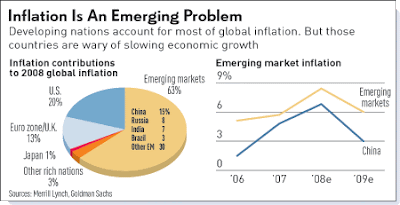High Oil Price Inflation Hits Global Economies
The global economy cannot run smoothly when oil prices approach or exceed $150 a barrel. An entire chain reaction of demand destruction occurs when energy overhead becomes too large a part of the budget. This is very much like a "light dimmer" or rheostat switch, dimming the global economy.
Global inflation is a side effect of higher energy costs, as well as a large demand destructor itself.
The low US Dollar is also to blame. But that really comes down to irresponsible spending on the part of the US Congress and multiple administrations going back to Johnson. Politicians cannot envision the longer term results of their short-sighted, vote-buying policies. What was true for 1960s through 1990s politicians will be doubly true for 2000s and 2010s politicians. Cut spending. Raise interest rates slowly. Pursue multiple energy strategies including nuclear, shale oil, offshore oil, ANWR oil, coal to liquids, biomass, waste heat recovery, CHP, solar thermal, and geothermal. Upgrade power transmission lines, making liberal use of HVDC technology to prevent cascading blackouts. Encourage distributed energy production such as residential PV and wind, where applicable. Encourage scalable modular nuclear fission such as helium cooled reactor designs.
Psychological neotenates are running governments now. They missed the critical periods of development when they should have learned responsibility and integrity. Modern politicians are still under the thumbs of their destructive and increasingly irrational special interest constituencies. But they lack the maturity to feel guilty about their growing levels of duplicity. ;-) The world may be in for a wild ride. During periods of financial instability, political, criminal, and fanatical ideological groups (such as jihadis) run rampant.
Meanwhile, the quest for the singularity and the next level continues. This would not be a good time to stop paying attention to global socioeconomic events.
Global inflation is a side effect of higher energy costs, as well as a large demand destructor itself.
Global inflation is set to rise from 3.5% to 5.8% this year, the highest in nine years, says Merrill Lynch. Nearly two-thirds of the increase will come from emerging markets...Developing nations don't want to slow growth -- especially with exports to the U.S. weakening.OPEC nations may soon pay the price for their failure to keep up with scheduled maintenance of their infrastructure, and with their failure to keep up with oil recovery technologies. Nationalised oil industries simply lack the motivation to maintain good business practises, as long as profits are good. And so now OPEC is faced with "demand destruction" as a result of its own ineptness in running the oil business.
"The longer they put it off, the worse the problem becomes and the harsher the medicine is going to be to get inflation under control," Behravesh said...A Morgan Stanley report says 50 countries, including India and Russia, are being torched by double-digit inflation rates.
"Ultimately it all comes back to one thing, which is oil," said Michael Hartnett, a global equity strategist at Merrill Lynch. "Oil is very much setting global inflation expectations. Until oil comes off in a meaningful way, people are going to expect interest rates to go up to cope with inflation."
Countries behind the curve in battling inflation are "being eschewed by institutional investors," said a report by State Street, which tracks fund flow. Among the countries: Vietnam, Thailand, Indonesia and the Philippines....India's stock market has plunged 40%. Its inflation rate tops 11%...Hartnett says the falling value of currencies in South Africa, South Korea and Turkey show that those countries are viewed as laggards in the inflation fight. _Y
The low US Dollar is also to blame. But that really comes down to irresponsible spending on the part of the US Congress and multiple administrations going back to Johnson. Politicians cannot envision the longer term results of their short-sighted, vote-buying policies. What was true for 1960s through 1990s politicians will be doubly true for 2000s and 2010s politicians. Cut spending. Raise interest rates slowly. Pursue multiple energy strategies including nuclear, shale oil, offshore oil, ANWR oil, coal to liquids, biomass, waste heat recovery, CHP, solar thermal, and geothermal. Upgrade power transmission lines, making liberal use of HVDC technology to prevent cascading blackouts. Encourage distributed energy production such as residential PV and wind, where applicable. Encourage scalable modular nuclear fission such as helium cooled reactor designs.
Psychological neotenates are running governments now. They missed the critical periods of development when they should have learned responsibility and integrity. Modern politicians are still under the thumbs of their destructive and increasingly irrational special interest constituencies. But they lack the maturity to feel guilty about their growing levels of duplicity. ;-) The world may be in for a wild ride. During periods of financial instability, political, criminal, and fanatical ideological groups (such as jihadis) run rampant.
Meanwhile, the quest for the singularity and the next level continues. This would not be a good time to stop paying attention to global socioeconomic events.
Labels: world economy


2 Comments:
I've seen simple analysis that shows that in silver, and likely gold too, the price of a gallon of gas has stayed pretty much steady. I wonder how that would go with crude prices?
That's part of the problem, the weak dollar. But oil has risen against the price of gold as well , due to supply/demand issues and probably a touch of speculative inflation.
It is still a serious problem, since a lot of world currencies are tied to the dollar, and within the US itself the people are paying for their elected officials' mistakes (on top of their own).
Post a Comment
“During times of universal deceit, telling the truth becomes a revolutionary act” _George Orwell
<< Home